Meghan McCain Is Having a Weird Year
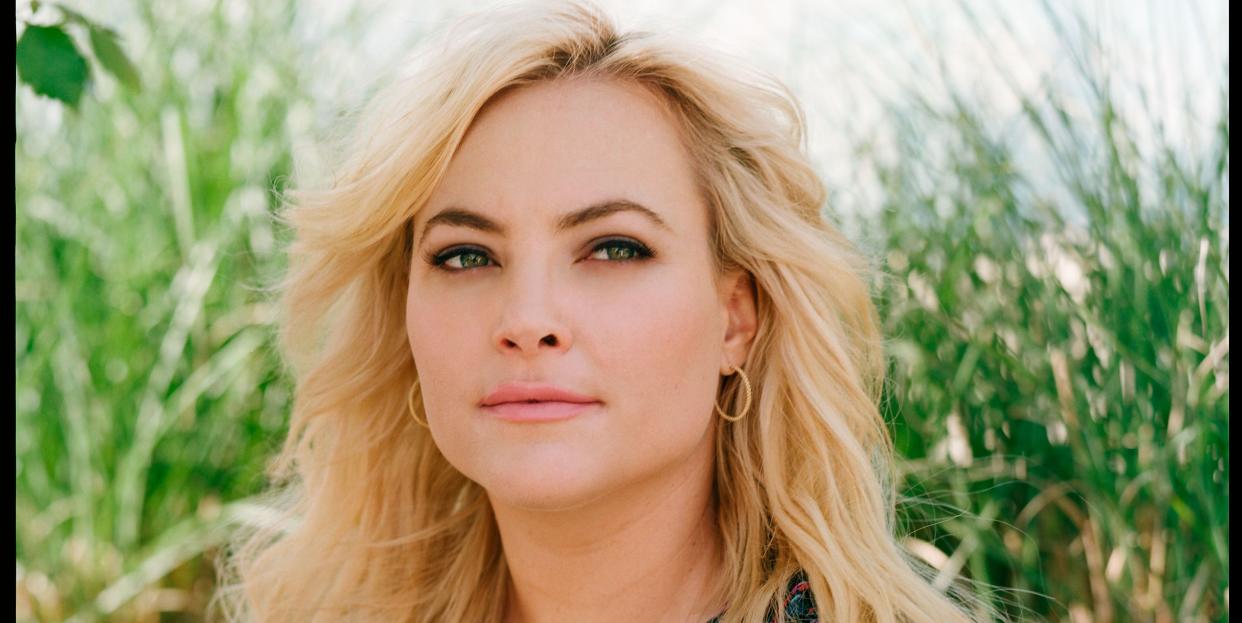

One afternoon in May, Meghan McCain arrives for lunch at a midtown Manhattan restaurant and states the obvious. “I feel like I’m controversial,” she says. Today the conservative cohost of The View, and the daughter of late senator John McCain, has swapped out her customary whimsical dresses and flashy pantsuits for a demure black sweater and slacks, and has the beleaguered disposition of someone who’s searched her name on social media one too many times.
Each week, a fresh wave of drama tries to knock McCain over: Occasionally, a spat with one of her more left-leaning cohosts will go viral. (“You don’t need to look at me that way,” McCain recently snapped at her cohost Sunny Hostin.) Other weeks, there will be an uproar over something she’s said in a heated segment about immigration or abortion. When there’s nothing serious to latch onto, there might simply be a surge of blind frustration aimed at the good old-fashioned nepotism that helped boost McCain to her current perch, or a chorus of cackles about something she’s chosen to wear.
“The audience [of The View] boos me,” McCain says when I ask her to elaborate on feeling "controversial." “It’s a very liberal audience in the studio, and they’re very vocal. People are always looking to turn you into something.”
This week’s shit storm took place outside The View’s comfortable daytime digs, on ABC’s This Week With George Stephanopoulos. Talk had turned to the San Diego synagogue shooting, prompting McCain to invoke the Minnesota congresswoman Ilhan Omar and draw a line between the tragedy and Omar’s much-debated language about Israel and the Jewish people. “When we’re having conversations about anti-Semitism, we should be looking at the most extreme on both sides,” McCain said during the segment. McCain tells me her concern over anti-Semitism intensified during the time of the Women’s March, when one of the event’s co-chairs refused to condemn Louis Farrakhan. “I would bring up Congresswoman Ilhan Omar and some of her comments that got so much attention, and in my opinion Nancy Pelosi wasn’t hard enough in her response to her trafficking in anti-Semitic language—talking about ‘all about the Benjamins,’ and how the Jewish people had hypnotized the world,” McCain told the panel on This Week.
This giant leap of reasoning was more than enough to sound the “Meghan McCain says something detestable” alarm bells. Within a few hours, McCain’s Google and Twitter search results were dominated by commenters dismayed by her willingness to link the horror of a multiple shooting to a couple of insensitive remarks by a progressive politician—remarks that Omar had already apologized for.
“I wasn’t surprised,” McCain says. “Bigotry is called out on my side, as it should be. The alt-right is disgusting; they’re very dangerous. But I don’t understand why someone like [Omar] should get a pass. I stand by everything I said.”
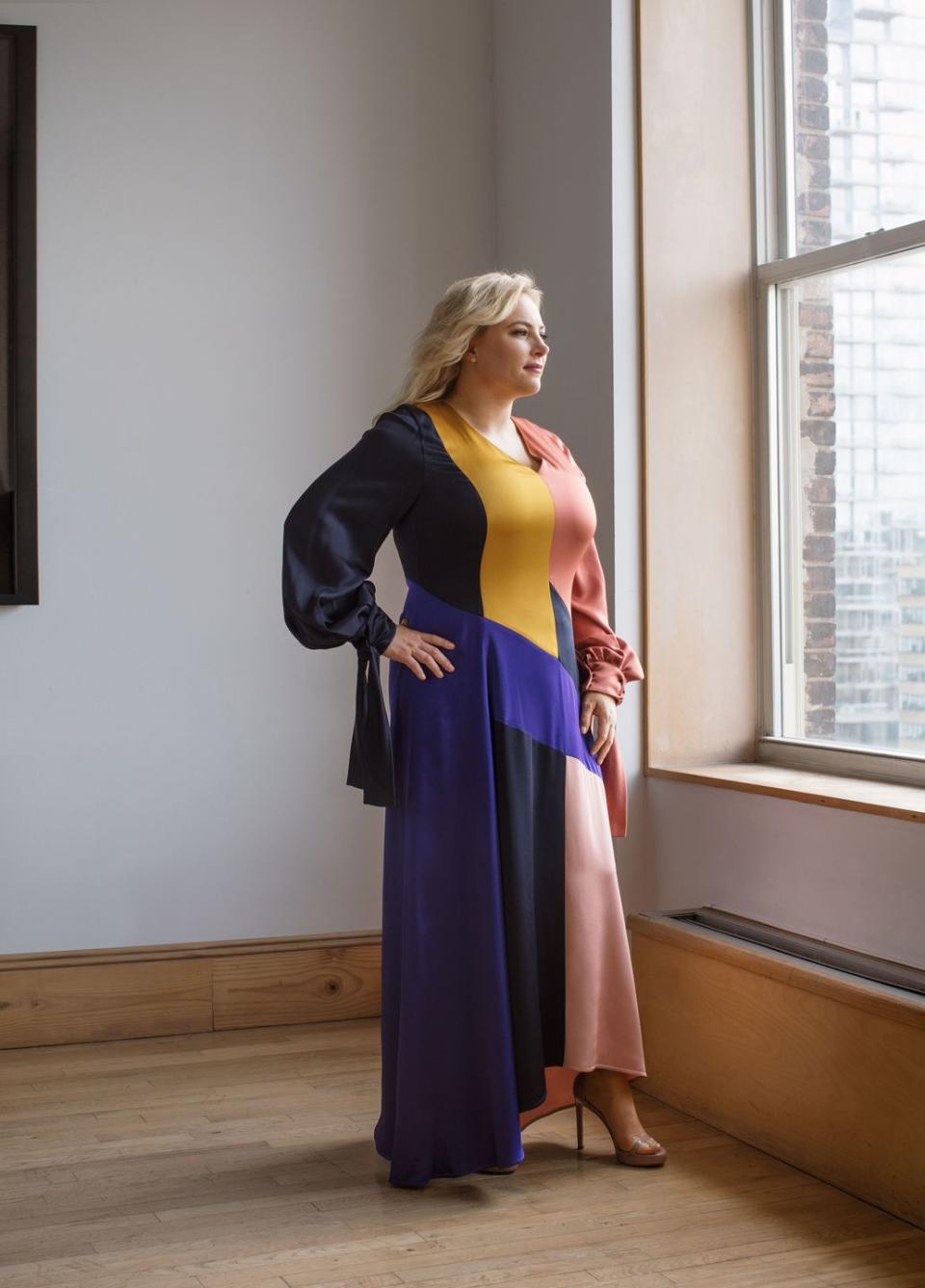
More than a decade after she stepped into the political arena, blogging about her father’s 2008 presidential campaign in her McCain Blogette—the oft-mocked, Elle Woods–ian ramblings of a daughter of political royalty—McCain has cut her way through the thicket of punditry. Removed from the cocoon of Fox News, McCain routinely makes headlines as the bête noire of daytime television and the leftist Twitterati. Her audience doesn’t simply dislike her political sensibilities, which are proudly establishment conservative rather than red-pill—they think she’s a stubborn, spoiled brat of Veruca Salt proportions. Her cascade of dyed-blond hair and her habit of starting her spiels with “my father” don’t help her cause. McCain’s career can be seen as a painful case study of the hall-of-mirrors effect of our current divisive era, one in which frustration begets reaction begets more frustration.
“The explosion in the culture war, which has happened with the rise of Trump, has made me more conservative. No Republican is good enough for a certain group of people. All Republicans are evil to a certain segment of the media,” she says. “And you become more tribal, and more territorial of your people and what you represent. And that has certainly happened to me.”
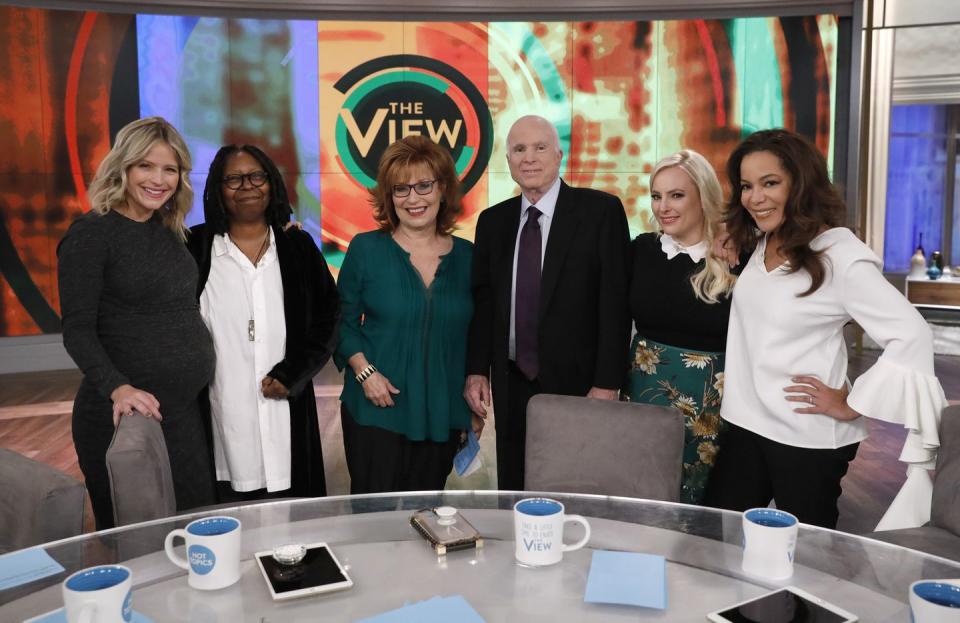
McCain likes to say she’s a disciple of her father’s trademark “Straight Talk Express.” “She speaks with a kind of intensity,” says Joe Lieberman, the former Connecticut senator and longtime John McCain pal who almost became McCain’s running mate in 2008. “It’s not nuanced. When Meghan takes a position, you know what she’s saying. That probably drives people on both sides crazy, but that’s who she is.” And while she’s not quite a troll, she’s built a career playing the role of the token deployed to rile up leftists. But the emergence of Trumpism has complicated things for McCain, who wants to defend the honor of old-school conservatism while retaining a semblance of level-headedness and credibility, lest she veer too far into Reddit rightism. “If I were sitting on Fox, I’d be considered a leftist,” McCain argues. But the more The View legitimizes McCain as a mainstream talking head, the more she feels like an outsider. If you want to be heard and liked as much as McCain seems to, there’s one giant problem with having made a career of rankling the left: You end up rankling the left.
McCain is not an entertainer by nature, which doesn’t mean she isn’t entertaining. In March, when the right-wing writer Denise McCallister described The View as “a roundtable of delusional mental midgets,” McCain responded on Twitter: “You were at my wedding Denise....” Within a few days, the tweet had been fully meme-ified, becoming a catchphrase used to signal indignation at even the mildest personal offenses and deployed by everyone from Lena Dunham to a screaming Shiba Inu dog. “My gift to the internet,” McCain later tweeted. “Thank you for the support.”
And yet McCain seemingly can’t predict what will delight the masses or infuriate them. She doesn’t wake up with an innate understanding of which levers to pull to please or enrage a certain constituency. This may be a reflection of naïveté rather than “straight talk.” But it’s still a form of sincerity. And that kind of bumbling truthiness lands her in hot water more often than not.
“It’d be so much easier for her to just, frankly, stay out of the public eye,” says Van Jones, the CNN pundit. When The Van Jones Show debuted, he had three guests in mind: Oprah, Jay Z, and Meghan McCain.“She’s the only young woman of her kind on the right. She’s not like Tomi Lahren, who’s clearly sitting there thinking, ‘How can I piss off as many liberals as possible?’ ” Jones says. “You can’t take your eyes off her, because she’s authentic. She’s really being herself.”
Throughout our conversations, McCain is constantly giving herself quick pep talks, reminders not to take it all so seriously. She cannot seem to decide whether she’s the victim or the independent, strong-willed maverick molded in her father’s image. When she starts to say anything that might read as self-pitying—complaining about how she’s become the left’s punching bag, or how the media would never treat liberal women with the same condescension she receives—she is quick to follow up, acknowledging her lucky lot in life and her own fortitude. “It’s fine. It comes with the territory. I’m a big girl,” she says.“I can take it.”
“We have a mutual kind of support dynamic going on,” Jones tells me. “Sometimes I’ll see something that I’m sure she’s not happy about, and I’ll give her a kind of encouragement. I always remind her that Twitter reality is not reality.” McCain’s longtime gay best friend, Josh Rupley, puts it more bluntly: “Bitch, you’re Meghan McCain, and you have to get up and walk the walk,” he has said to her. Still, walking the walk can feel more like walking the plank these days. McCain tries not to read Twitter too much. “I knew that [the Omar bit] was getting attention because my publicist told me,” she says. “I think that when you read enough criticism, you start censoring yourself. Success is not censoring myself.”
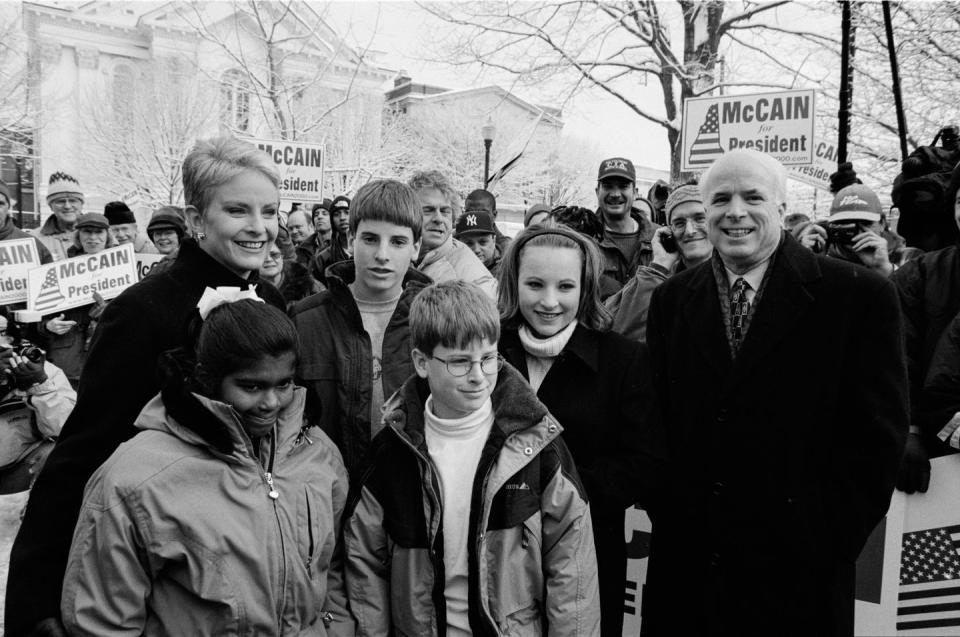
McCain is close with her mother, Cindy, who is supportive of her daughter’s career. “I give her the same advice each time: A lot of this stuff is in the moment, and choose wisely when you begin to criticize. Don’t get angry. Never get angry,” Cindy says. “We used to joke, and I mean this in a loving way, that she is John McCain in a dress,” she adds. “My daughter was always strong-willed. She was tenacious in a way that she would—not that she was doing anything bad, but she was just curious and always asking questions. She would test me on things. She was certainly one where I got what I wanted: a strong-willed, independent woman.”
For now, McCain is trying to take her mother’s advice and to behave like a grown-up. “She [Omar] doesn’t scare me, and I’d actually love it if she came on the show,” she says.
McCain’s background is her calling card, and a running joke by now: She grew up one of seven children in Arizona, a border state where free time was dominated by political discussions, camping, and hiking. She likes to remind viewers of her Arizonan roots so often that when Saturday Night Live recently parodied The View, Aidy Bryant’s impersonation included a line in which McCain referred to herself as the Princess of Arizona. When McCain graduated from Columbia University in 2007, she was as aimless as most 22-year-olds. Unlike most of her peers, however, she had a father who was about to launch a bid for president. Once Senator McCain became the Republican nominee, his daughter joined him on the campaign trail, where she was not exactly treated like a valued member of the team. Her 2010 book Dirty Sexy Politics is the memoir of a young person frustrated with her position in the world. She regaled readers with complaints about being constantly cast out of McCain’s inner circle for being too green, too blond, too messy, too unpredictable, too much of a nuisance. “It’s not great,” McCain says of that book now. “I shouldn’t say that book wasn’t good. It was a moment in time.”

Once Senator McCain’s presidential run was stopped short by Barack Obama, McCain packed up her stuff and headed back to Arizona for a period of respite before entering the arena of political television. Over the next few years, she held a series of unremarkable roles on MSNBC, Fox News, and an ill-fated young cable network called Pivot. She admits she’s been on plenty of shows that “nobody watched.” But by mid-2017, the world had shifted dramatically, both inside and outside of McCain’s life. Her father had been diagnosed with brain cancer and was rapidly declining. And Trump had been elected president of the United States. As he’d risen to power, Trump had made a point of targeting Senator McCain and his career-defining war experiences, smugly pointing out that he’d been captured and insisting that he’d failed the state of Arizona during his time in Congress. Throughout this period, the McCains emerged as leading voices of the Republican establishment’s anti-Trump faction. Senator McCain was one of the most vocal on the right in the wake of the Access Hollywood tape: “Donald Trump’s behavior this week, concluding with the disclosure of his demeaning comments about women and his boasts about sexual assaults, make it impossible to continue to offer even conditional support for his candidacy,” he announced.
At the time The View came calling in 2017, both of McCain’s parents had, as Cindy puts it, “their differences” with the show. Neither had appeared as guests since 2008. But when their daughter was given the opportunity to host, to fill the conservative seat once occupied by the glamorous Elisabeth Hasselbeck, they advised her to accept the position. Senator McCain was gravely ill, and anything he told his daughter to do, she happily complied with. “I didn’t take the offer seriously, because, no shade to the show, it just wasn’t the show that I wanted to work on. A carousel of people getting on and off; it didn’t seem to have a lot of direction,” McCain remembers. “And it was my dad who talked me into it. He said, ‘You can’t ever give up an opportunity to work on a network with Whoopi Goldberg.’ ”
“It’s clear that The View works best when it has a strong conservative voice, especially as politics becomes more front and center in our current climate,” says Brian Teta, one of the show’s executive producers. Part of the reason that a strong conservative voice works, of course, is so that the other, more center- or left-leaning hosts have someone to bounce off of. Yet this puts McCain in a sticky spot. Her struggle to make her points heard has become a punch line; her tendency to pipe up and ask,“Can I just say something?” has probably been made into a superclip. (Teta, however, tells me that McCain prefers to go last in roundtable discussions so that she can assess the other hosts’ opinions before making her move.) Her weekly spats with Joy Behar, the show’s progressive veteran, are the subject of endless fascination on YouTube and in blogs, which spin the disagreements as catfights. “Most of the time it’s complete bullshit, but sometimes there’s some truth to it,” McCain admits.
“We don’t look for fights, and we don’t try to create fights,” Teta says. “And it’s not good for there to be too much of it—the blood runs hot in the moment, but then they move on.” Still, “I get frustrated when I feel shut down,” McCain says.
“My presence on the show has been, ‘Nobody’s going to bully me, nobody’s going to talk down to me, and nobody’s going to pull the kind of shit that’s been pulled on a lot of people in this chair. And I will be vocal, and I will live in the moment, for better or worse,’ ” McCain says defiantly, before backpedaling. “I should be better at being less reactive.” She remembers one night last year when she went out with her colleagues for drinks and got tipsy. The next morning, when it was time to film, she carried the convivial attitude of the previous night onto the show, and a crass line slipped out of her mouth: “I call her Crooked Hillary!” she said. “I hate Hillary Clinton.” McCain is still embarrassed about it. “I apologized on TV and said that I was contributing to the polarization of this country. I really regret saying that. She was friends with my dad. It’s really not fair.”
In the real world, McCain’s life is exceedingly uncontroversial. She lives with her husband, Ben Domenech, the conservative political commentator and publisher of The Federalist, on a quiet Midtown block. The pair met on Twitter. "He slid into my DMs," McCain says. Not even a year has passed since her father’s death, and grief seems to occupy much of her brain space. Like many 34-year-old women, she’s debating the prospect of having children, but still can’t seem to shake the nagging sense that motherhood is at odds with the life of a career woman.
“I used to be very, like, ‘I’m never having kids!,’” she says. “[But] think of any choice in your life—I think raising kids and being successful at that is an incredible achievement.” She speaks with a sober intensity on the subject of motherhood. McCain does not reveal this information to me, but children are top of mind because our interview happens around the same time she experiences a miscarriage. Later, she will publish an op-ed in the New York Times about losing a child, again grappling with the career woman vs. mom dichotomy. “I blamed myself [for the miscarriage],” she writes. “Perhaps it was wrong of me to choose to be a professional woman, working in a high-pressure, high-visibility, high-stress field, still bearing the burden of the recent loss of my father and facing on top of that the arrows that come with public life.”
To handle the aforementioned stressors of her life, McCain tries her best to look after her physical and emotional health, going to grief counseling and therapy, meditating (“even though I’m terrible at it,” she says), taking SoulCycle classes, getting massages, and watching TV. She’s stopped the heavy drinking she was known for in the McCain Blogette days. She’s a Real Housewives addict, and the last movie she saw was Jordan Peele’s Us. “I just thought it was fantastic,” she says. “I think he’s the Alfred Hitchcock of our generation.” While McCain has embraced her role as a political enthusiast, there’s a palpable sense of relief coming from her when the conversation steers toward culturally neutral topics.
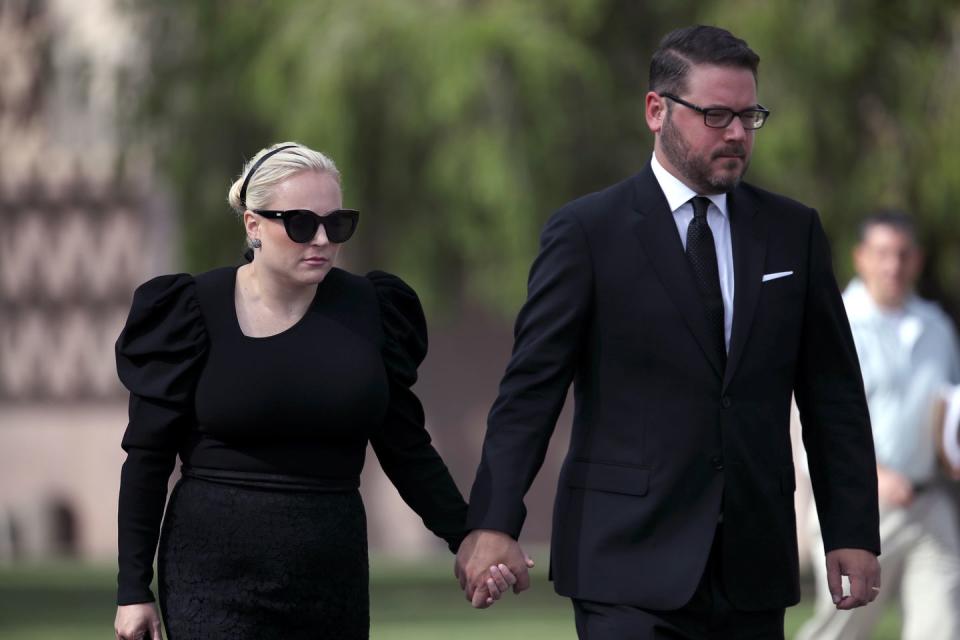
McCain is also even-keeled when discussing the upcoming presidential election. As a staunch Republican who refuses to vote for Trump, she’ll effectively function as a bystander in this race. She delights in dissecting the merits and drawbacks of the crowded Democratic field. “My husband and I woke up and talked about Pete Buttigieg being on the cover of Time magazine, and we spent about 15 or 20 minutes talking about why he’s resonating, and if he’s taking votes from Beto or Booker,” she says.
I mention that Buttigieg’s spokesperson, Lis Smith, recently said he might be taking some campaign strategies from her father’s playbook. “She said that?” squeals McCain, a woman for whom blood always runs thicker than party lines. “I gotta look that up. He’s a great candidate in a lot of different ways. I like that he’s talking to the middle of the country and talking about religion. It’s fascinating that we’re having conversations about him as a white male and completely leaving out the fact that he’s gay,” McCain adds. Like many Republicans, McCain has softened on the issue of LGBTQ rights, to the point of becoming an outspoken pro-gay advocate, which she credits to her relationship with Rupley.
“I think a lot of activism stems from love,” she says. I ask what she would do if she fell in love with or became close friends with an undocumented immigrant. “I think anytime you become close with anyone, it can change your worldview,” she says. “I don’t know any illegal immigrants. I know people who have immigrated here.” But, she adds, “I’m not as hard-line on immigration as Trump.”
The other wild card in the upcoming election is Joe Biden, the leading Democratic establishment candidate, who’s become McCain’s number one grief counselor. Their personal bond leaves her in the precarious position of being a Republican mulling the prospect of formally endorsing a Democrat. “Even if I did endorse him, it would hurt him,” she admits. “I love Biden in a way that I loved my father,” she says.
“I keep trying to think of what my dad would do in this situation,” McCain adds. “I want to see what Biden’s message will be. If he’s the person I know he is, it’s going to be very tough [to remain neutral].”
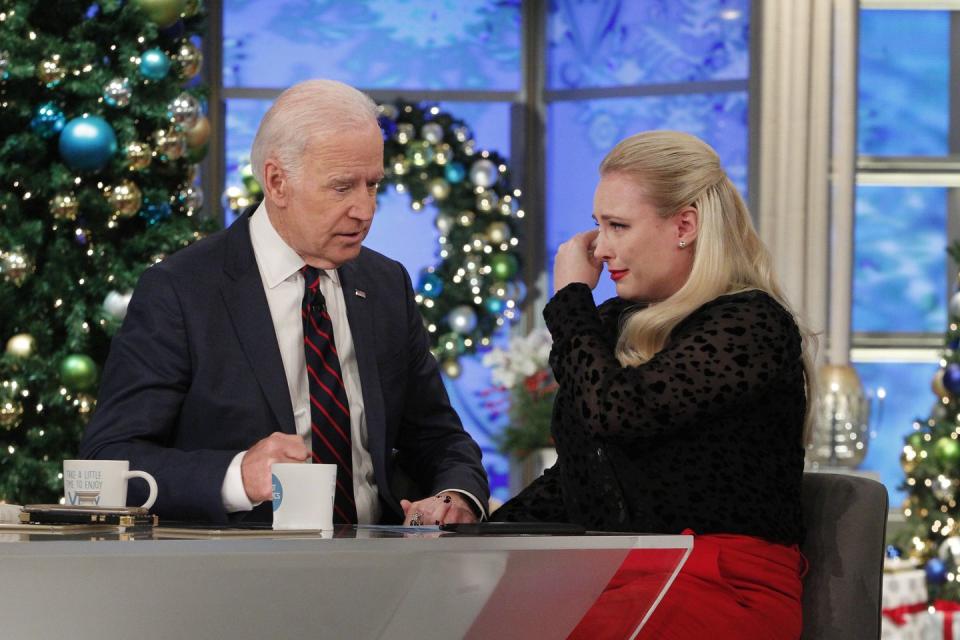
Most of McCain’s micro-scandals die down after a few days, but this Omar thing has legs. (As of last week, McCain was still talking about Omar.) Two weeks after we have lunch, McCain’s remarks have become a full-blown fiasco, thanks to an uncomfortable appearance on Late Night With Seth Meyers, which had been scheduled, canceled by McCain, and rescheduled three times over the last year. Halfway into the interview, Meyers chose to puncture the genial conventions of late night, pressing her repeatedly on the Omar remarks.
“You do keep bringing up the two tweets that she’s apologized for, and I think that’s a little unfair to her,” Meyers said. “Are you her publicist?” McCain shot back, her breath quickening. The next morning, McCain’s husband wrote on Twitter that Seth Meyers was an “untalented piece of shit who only has his job because he regularly gargled Lorne Michaels’s balls.”
When I call McCain the following week, she sounds rattled—even though there’d been a pre-interview briefing her on the Omar talking point. “I thought that it was going to be fun, and what you expect a late-night show to be. The way he talked to me can speak for itself,” she says. She remembers the days when she routinely appeared on Jay Leno’s show, where conversations were blissfully “kind and open.”
“But I’m not a snowflake, and I’m not precious. I can take it,” she reminds me, then adds, “I want to be heard, and I don’t want to be a person who’s brought on to be virtue-signaled to about the things we disagree on.”
I ask how she felt about her husband’s tweet, which prompts her publicist to interject. “Carrie, can we not get into the Twitter stuff?” she pleads. McCain ignores her. “I will say I was asleep when he tweeted. I don’t think it’s productive to ever go on tweet storms about people. But we love each other very much, and a lot of times it does feel like.... I understand it’s very jarring to be confronted by a woman like me who represents so many of the things that [people] don’t like and agree with. And the problem is, there’s only one of me! I don’t like that we’re all living in such a vacuum. And not to totally abuse an old adage, but it really is why Trump won.”
“I don’t know if [Meyers] could have gotten away with speaking to a liberal woman the way he spoke to me,” she continues. “I don’t think he wanted to have a conversation; I think he just wanted to lecture me. But I can’t get myself into a place where I’m like, Woe is me. It’s not fair for me to feel bad for myself,” she adds. “I would be curious if you could get a quote from him and ask him what he thought.”
And so I do reach out to Meyers’s team. It would be tempting for him to take the bait, given how easy a target McCain is—the court of public opinion has looked favorably upon anyone who tries to get into battle with her. And yet, as if to prove McCain wrong, Meyers takes the gracious tack. “I’m grateful Meghan made time to come on the show. While we may have disagreed on some things, I certainly appreciated having an important conversation,” he writes in an email.
This is exactly the kind of gentlemanly tone that McCain was probably hoping would define her segment on Meyers’s show. And yet there’s a hint of smugness in his response that seems designed to emphasize just how crazy, how shrill, McCain is. It’s this disorienting echo chamber, which she is part and parcel of, that McCain—like most of the country—is getting dizzy over. During our last conversation, there is the overwhelming sense that she’s getting fatigued. This latest blowup is making it painfully evident that the pitfalls of her position are almost as powerful as the duty she feels.
And yet, McCain will continue to engage on the subject of Omar. Earlier in July, after Trump supporters chanted “send her back” at Omar, McCain argued on The View that her anti-Omar claims were more valid than Trump’s racist ones. This went viral, and McCain issued an uncharacteristic apology on Twitter.
“I’m innately a fighter, but I do question if there will be a certain time where it just won’t be worth being a Republican woman being screamed at all day,” she says over the phone. “I don’t know. Maybe I’m just having a bad week.”
Top look: Dress, Jason Wu Collection, Earrings, Lagos. Styled by Lauren Sample. Hair by Yukiko Tajima for Kerastase; Makeup by Sandrine Van Slee for Chanel Beauty.
This article originally appeared in the August 2019 issue of ELLE.
You Might Also Like

